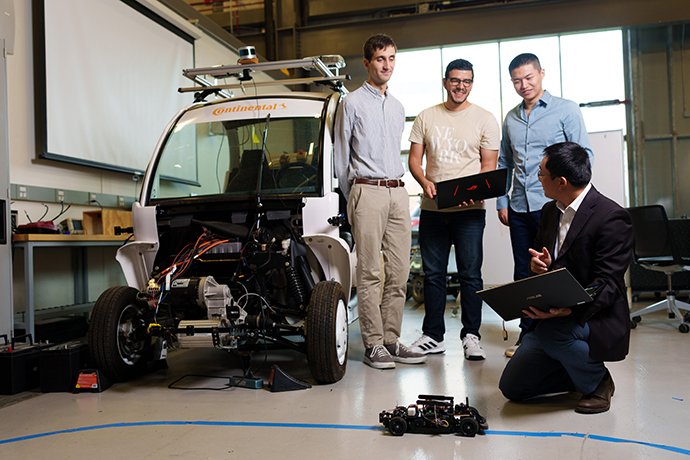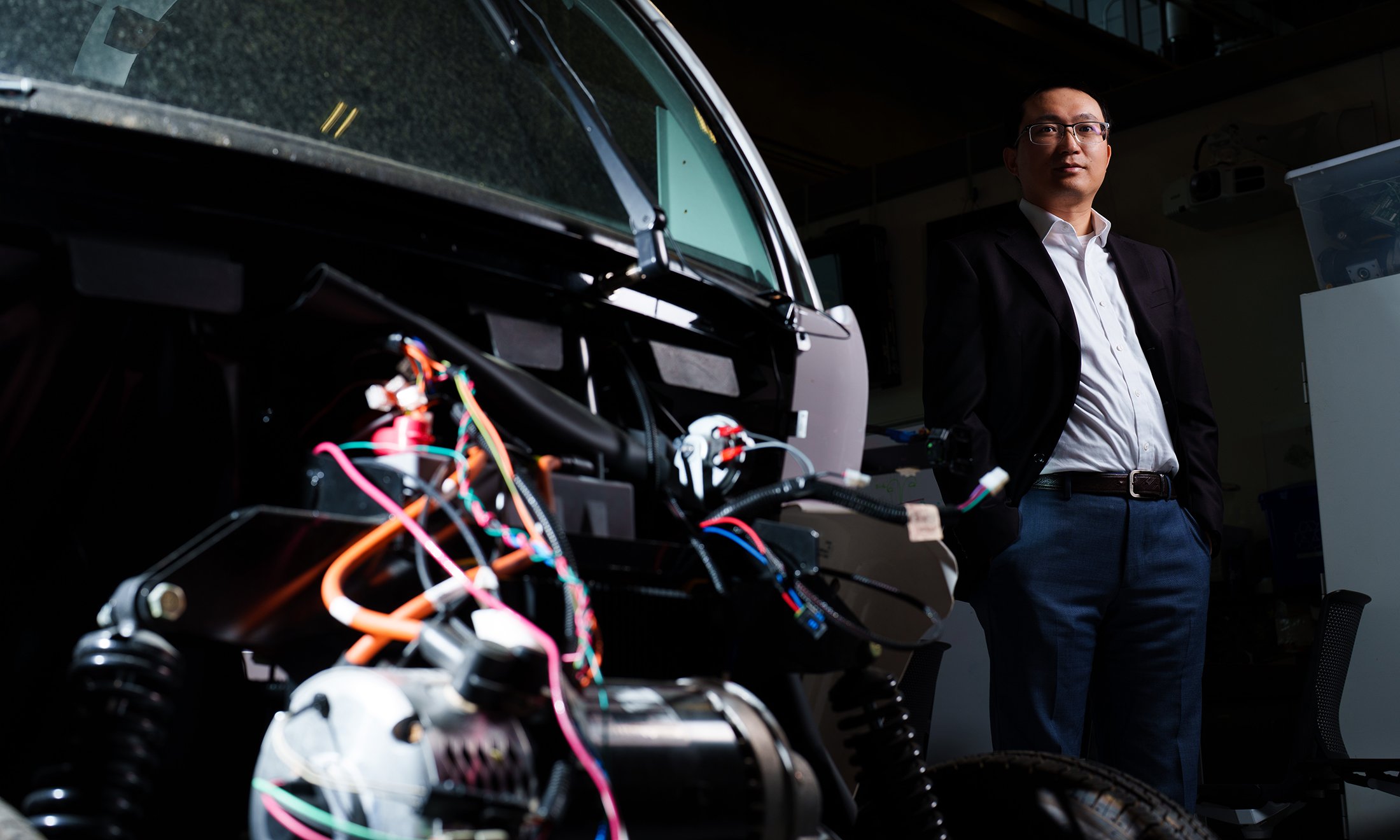In Control
Dr. Jun Chen leads research on model predictive control in automotive embedded systems, recently awarded $500K by NSF Faculty Early Career Development Program.
Over the years, control systems employed by many industries have drastically changed to allow for more complex actions and nonlinear dynamics. To meet industry needs for controls able to accommodate complex behaviors that involve either dynamic or dangerous environments inaccessible to human intervention, Jun Chen, Ph.D., assistant professor in the Department of Electrical and Computer Engineering, leads research on model predictive control (MPC) in automotive embedded systems.
“Imagine walking in a dark room, attempting to make sense of the surroundings and predicting the best path to reach your goal — all while taking one step at a time and repeating the cycle. This seems rather inefficient. However, if one can receive ongoing directions anticipating each step, the task can be performed rather quickly and efficiently. Model predictive control does exactly that. It is a multivariable control algorithm that computes optimal control inputs based on predicted future outputs,” Dr. Chen explains.
 |
| Dr. Chen and OU graduate students Zhaodong Zhou, Christopher Rother and Ali Irshayyid apply event-triggered MPC to an autonomous vehicle path tracking problem. |
As a real-time optimal control technique, MPC has been widely used in process industry to achieve a production level of consistency, economy and safety that could not be accomplished by only human manual control. Since MPC can be applied to both linear and nonlinear systems and handle explicit constraints on inputs and states alike, it has been one of the most popular control methods for various applications. The focus on adopting MPC in embedded automotive control, however, is rather recent.
“MPC is very suitable for integrated vehicle control, where the control commands of multiple actuators are simultaneously optimized. This includes coordinated active front steering and differential braking using MPC, utilized MPC for simultaneous longitudinal and lateral control for electric vehicles and achieved integrated vehicle dynamic control by torque vectoring through MPC,” Dr. Chen says.
Since MPC solves, at each time step, an optimal control problem (OCP), it requires high computational power. Embedded environment, on the other hand, offers considerable challenges to its use due to a low computing power/precision of electronic control unit (ECU) and a lack of tools for pre-production verification and validation (V&V).
In order to reduce the MPC computation without significantly degrading the control performance, one direction that Dr. Chen and his team initially explored was event-triggered MPC, when MPC was triggered to formulate and solve the OCP only as needed. Led by Dr. Chen, OU graduate students Zhaodong Zhou and Christopher Rother applied event-triggered MPC to an autonomous vehicle path tracking problem. The OPC was formulated to track the vehicle path in both longitudinal and lateral directions, with axle driving torque and front steering input as the control variables. Control performance and throughput requirements of different MPC setups were measured and compared.
“What we found out was that compared to time-triggered MPC, benefits of event-triggered MPC on computation saving were very clear. Event-triggered MPCs relaxed computational needs while maintaining control performance. We developed an efficient nonlinear MPC algorithm suitable to execute in embedded ECU and offered a V&V tool that allows practitioners to perform thorough V&V before deployment,” Dr. Chen explains.
Yet, as the scientist readily admits, there were limitations: event-trigger policies usually required a prior knowledge of the MPC closed-loop system behavior, which was not always the case.
To overcome these limitations, the group undertook the task of investigating the use of model-free reinforcement learning (RL) to trigger MPC. The research was conducted at OU’s Optimal Control and Artificial Intelligence Lab that supports areas of AI-enhanced advanced control and optimization algorithm development with application in automotive and energy systems.
As a result, the team proposed an algorithm, RLeMPC, which does not require any knowledge of the MPC closed-loop system behavior and provides a direct calibratable parameter to balance between control performance and MPC computation load. When RLeMPC was applied to an autonomous vehicle path following problem, it outperformed threshold-based event-trigger mechanism.
“Compared to traditional control, MPC can predict the future state of the vehicle within a certain period of time and finds the optimal control sequence within the forecast time through the prediction of the future vehicle state. This is in line with human driving habits because people subconsciously judge the future state of the vehicle when driving. However, this task requires a complex vehicle model to calculate, and the amount of computation may exceed the limit of vehicle’s central processing power. By reducing the amount of control without affecting performance, we are making the self-driving car more stable,” says Zhaodong Zhou, Ph.D. student in electrical and computer engineering.
Automotive embedded systems are not the only area for Dr. Chen and his team’s investigation. The group, that also includes Ph.D. student Ali Irshayyid, is working on other applications, such as personalized autonomous driving, power converter control, battery balancing control, multi-vehicle formation control, and renewable energy integration.
Dr. Chen’s research was partly supported by SECS Faculty Startup Fund, OU’s URC Faculty Research Fellowship, Michigan Space Grant Consortium seed funding and a gift fund from Intelligent Fusion Technology.
In December 2022, Dr. Chen received $500,000.00 from NSF Faculty Early Career Development Program (CAREER) to fund his project "Reconfigurable and Predictive Control with Reinforcement Learning Supervisor for Active Battery Cell Balancing” for the duration of 5 years.
Please visit Dr. Chen's website for more information or connect with him at [email protected]

 December 18, 2022
December 18, 2022
 By Arina Bokas
By Arina Bokas









